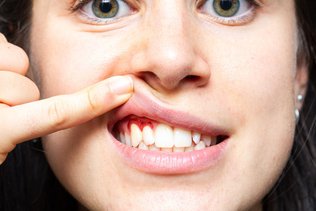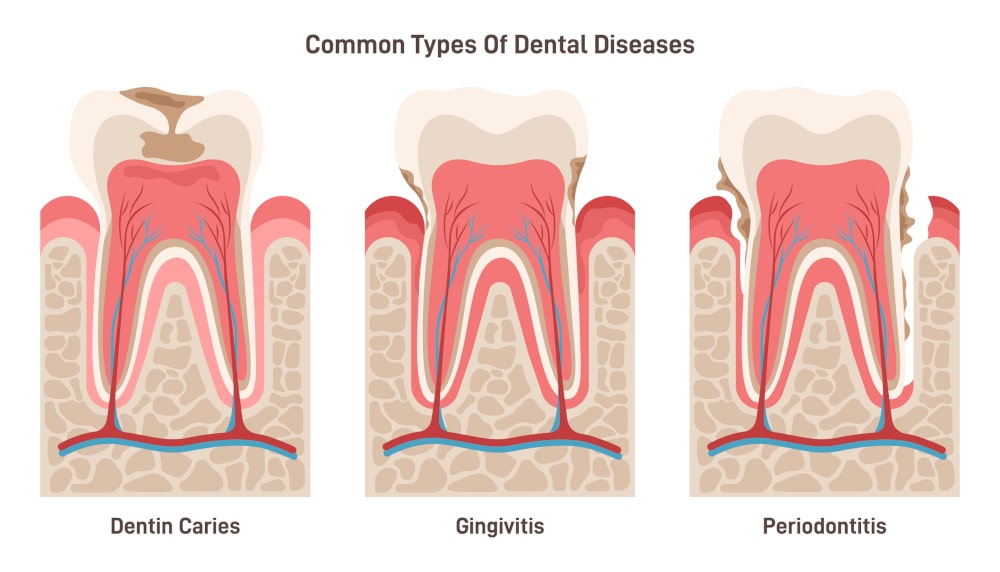
Why Do My Gums Bleed?
Key Takeaways
Gum disease can progress quite painlessly till it becomes severe. Poor hygiene, deficiencies, or even underlying medical conditions might cause bleeding gums. This article describes the common reasons for bleeding gums together with actionable measures to prevent gum bleeding and boost gum health.
Common Causes and Solutions
“Seven out of 10 Canadians will develop gum disease at some time in their lives.”
Bleeding gums may not feel like a serious health issue but it is usually a sign of serious health concerns that require medical attention. Poor oral hygiene, nutritional deficiencies, and serious health conditions can all cause your gums to bleed. Knowing why gums bleed is essential if you want to maintain good oral health. This guide takes you through the most common causes of bleeding gums and recommends actionable steps to improve gum health.
Gums are soft tissues that protect the bones and roots of the teeth. Healthy gums don’t bleed unless injured. Gum bleeding is often a response to irritation, inflammation, or a serious health concern. If you experience frequent gum bleeding, even during routine brushing or flossing, treat it as a big red flag and see your dentist immediately.
Poor Oral Hygiene
Bacteria form a sticky biofilm (Plaque) on your teeth daily. Regular brushing and flossing can remove this film. But if it is not adequately removed, it hardens and becomes tartar. Tartar sticks to the teeth and irritates the gums. This leads to redness, swelling, and bleeding of gums or gingivitis. This is the earliest stage of gum disease.
Why do gums bleed when flossing? If you don’t floss regularly, plaque may collect near the gums. It can cause bleeding when you begin flossing. Don’t be alarmed. Consistent flossing helps your gums become stronger over time.
Solution:
Brush at least two times a day and floss once daily.
Use a soft-bristled toothbrush to preserve sensitive gum tissue.
Visit your dentist every 6 months for professional cleanings. They can remove any tartar that brushing can’t.
Gingivitis and Periodontitis
The plaque may induce inflammation, making your gums tender, red, and easy-to-bleed. The good news is it can be reversed with proper oral care.
When gingivitis is not treated, it can progress to periodontitis. Peridontitis is a condition where the gums pull away from the teeth, forming pockets that further trap bacteria. This is an advanced stage of gum disease. It can lead to loss of bone and tooth.
If you notice any of the following symptoms, you need to see a dentist soon:
Persistent bleeding gums
Receding gum line
Loose teeth
Bad breath
Solution: Your dentist may recommend scaling and root planing (deep cleaning to remove bacteria from below the gum line). In advanced cases, intensive oral care or surgery may be needed. Regular dental checkups are key to early diagnosis and management.

Vitamin Deficiencies
Collagen keeps gum tissue strong and Vitamin C is vital to collagen production. Its deficiency can make the gums weaker and prone to bleeding.
Vitamin K helps in blood clotting. Its deficiency may make your gums bleed excessively during brushing or flossing.
Solution:
Make sure your diet has foods rich in Vitamin C, like citrus fruits, bell peppers, and strawberries.
Consume Vitamin K-rich foods, like spinach, kale, and broccoli.
Consult your doctor if you suspect a vitamin deficiency or if bleeding persists.
Hormonal Changes
Hormonal changes can increase blood flow to the gums, making them prone to bleeding. This may occur during pregnancy, menstruation, and menopause.
Solution:
Maintain excellent oral hygiene during periods of hormonal changes.
Schedule regular dental visits for teeth cleanings. Your dentist can guide you on taking care of your teeth and gums when you have unique needs.
Medications
Certain medications, such as blood thinners like aspirin, can make your gums vulnerable to bleeding. Immunosuppressants may also worsen gum inflammation or sensitivity.
Solution:
Inform your dentist about any medications you take.
Follow your dentist’s recommendations for managing gum health.
Smoking
Tobacco harms the immune system, lowers blood flow to the gums, impacts the body’s ability to fight infections. Smokers often experience gum irritation, slower healing, and bleeding. Smoking can also mask symptoms of gum disease, preventing you from seeking timely treatment.
Solution:
Quitting smoking is the most effective solution to restore gum health.
Antibacterial mouthwash and regular dental cleanings will help to maintain oral health and fight bacteria.
Stress and Immunity
Stress negatively affects the immune system, making the body susceptible to infections, including gum infections. Chronic stress can also make a person neglect oral hygiene routines, making the problem worse.
Solution:
Manage stress with mindfulness, exercise, or therapy.
Follow a consistent oral hygiene routine everyday.
Regular Dental Visits
Routine dental checkups play an important role in preventing and treating gum problems. At Skymark Smile Centre, we offer comprehensive dental care, including:
Deep Cleanings: Removes plaque and tartar buildup
Gum Health Assessments: Early detection of gingivitis or periodontitis
Personalized Care Plans: Personalized advice to improve gum health.
FAQs
Q: Why do my gums bleed when I floss? If you do not floss everyday, plaque may build up around your gums. When you start flossing, it may initially cause your gums to bleed. However, regular flossing can reduce inflammation and bleeding, as your gums adapt. If you still notice bleeding in your gums, see a dentist immediately.
Q: What deficiency causes bleeding gums? Deficiencies in Vitamin C or K can lead to bleeding gums. Vitamin C strengthens gum tissue, while Vitamin K aids in blood clotting.
Q: Can stress cause my gums to bleed? Yes, stress weakens the immune system and makes you prone to gum inflammation and infections, which can lead to bleeding.
Q: Are bleeding gums always a sign of gum disease? Not always. Hormonal changes, medications, and deficiencies can also cause bleeding. See a dentist immediately if you notice persistent bleeding in your gums.
Take Action for Healthier Gums Bleeding gums is a manageable condition, if diagnosed and treated early. Proper oral hygiene, balanced diet, and regular dental checkups can keep your gums healthy and strong for a lifetime. For personalized solutions, schedule a visit at Skymark Smile Centre today!

